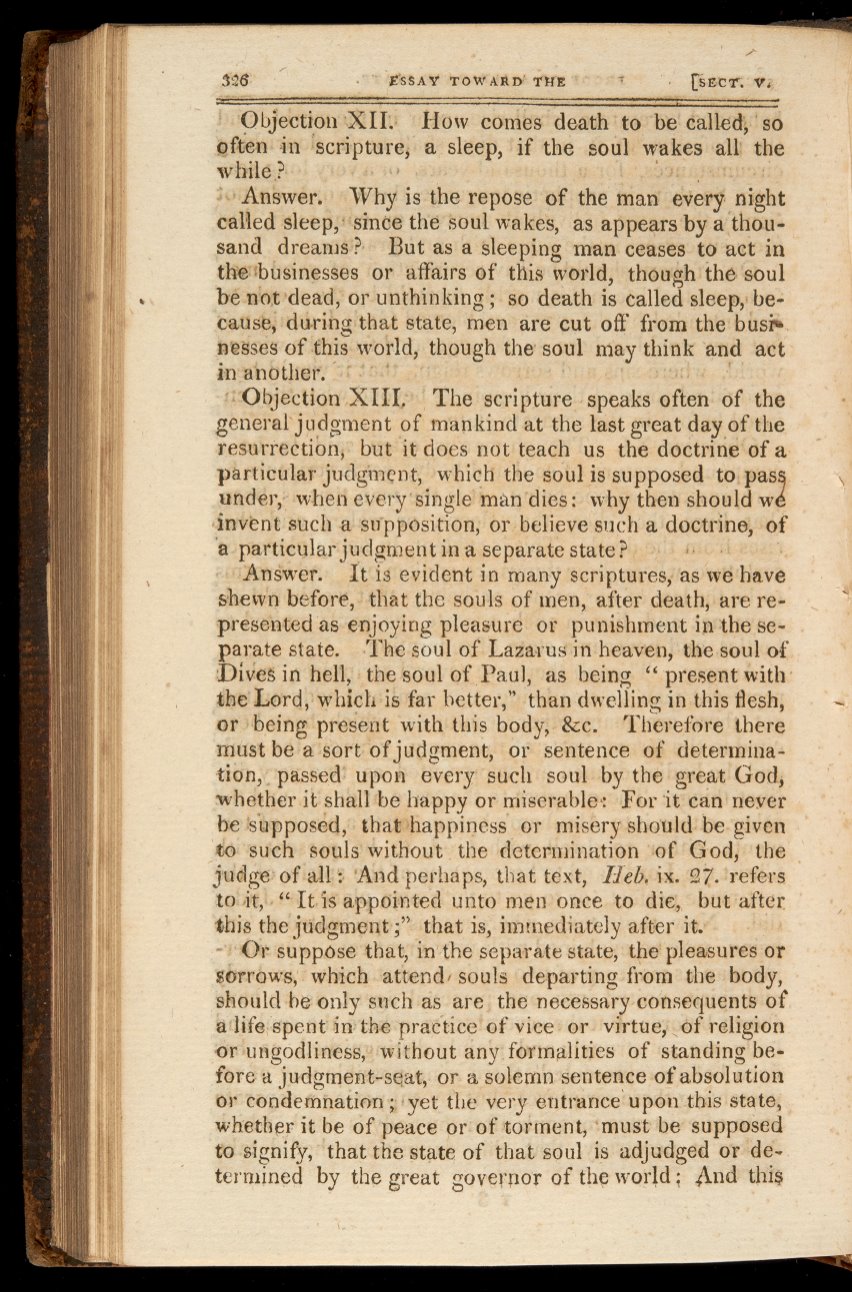

3°6
ESSAY TOWARD'
THE
{SECT. V.
Objection
XII.
How comes
death
to be
called,
so
often
in
scripture,
a
sleep,
if
the
soul wakes all
the
while
Answer. Why
is
the repose
of the
man
every
night
called
sleep,
since
the soul
wakes, as
appears
by
a
thou-
sand
dreams
?
But
as
a
sleeping man ceases to
act in
the
businesses or affairs
of
this
world,
though the soul
be
not
dead, or
unthinking
;
so
death
is
called
sleep,
be-
cause, du
-ring
that
state, men
are cut
off from the
busies
nesses
of
this
world, though
the soul may think
and
act
in
another.
Objection
.XIII;
The scripture
speaks often
of
the
general judgment
of
mankind
at
the
last great
day
of
the
resurrection,
but
it does
not
teach
us
the
doctrine of
a
particular
judgment,
which
the
soul is
supposed to pas
under,
when
every'single
man
dies:
why
then should
wé
invent
such
a
supposition,
or believe such
a
doctrine,
of
'a
particular judgment
in
a
separate state?
Answer.
It
is
evident
in
many scriptures,
as
we
have
shewn before,
that
the
souls
of
men,
after
death,
are
re-
presented
as
enjoying
pleasure or punishment
in
the
se-
parate
state.
The
soul
of
Lazarus
in
heaven, the soul
of
Dives
in hell, the
soul
of
Paul,
as
being
"
present with'
the
Lord,
which
is
far better," than
dwelling
in
this
flesh,
or
being present
with this
body, &c.
Therefore there
must
be
a
sort
of
judgment, or sentence
of
determina-
tion,,
passed
upon
every
such soul
by
the great God,
whether it shall
be
happy or miserable:
For
'it
can never
be
súpposed,
that
happiness or
misery
should
be given
to
such souls without the
determination of God,
the
judge
of all
:
And perhaps,
that
text,
lieb.
ix.
27.
refers
to
it,
"It
is
appointed unto
men
once
to die,
but after
this
the
judgment
;"
that
is,
immediately
after
it.
Or
suppose that,
in
the
separate
state, the
pleasures or
sorrows,
which
attend,
souls
departing
from
the body,
should
he
only such
as
are the
necessaryconsequents
of
a
life
spent
in
the
practice
of
vice
or virtue,
of
religion
or
ungodliness,
without
any
formalities
of
standing
be-
fore
a
judgment
-seat,
or
a solemn
sentence
of
absolution
or
condemnation
;:yet
the
very
entrance' upon
this
state,
whether
it
be
of
peace
or
of torment, 'must
be
supposed
to
signify,
that
the state
of
that
soul
is
adjudged or de-
termined
by
the
great governor of
the world
;
And
this

















